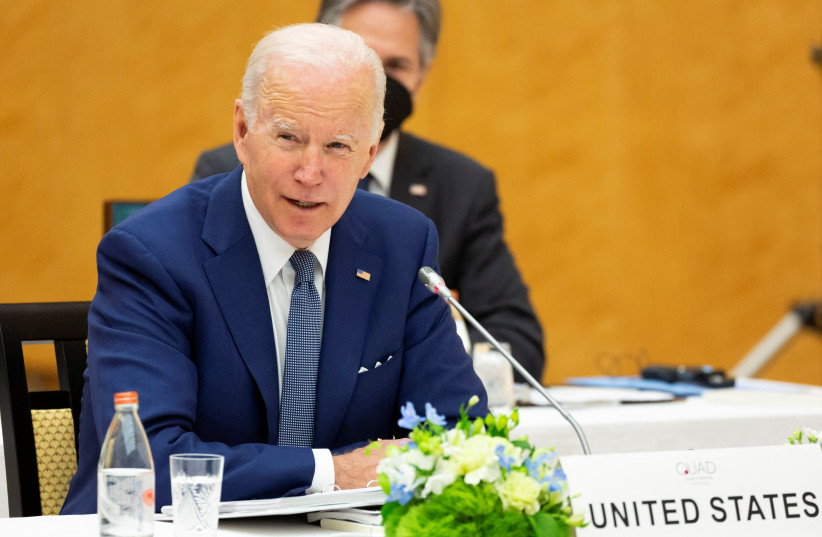President Joe Biden’s first visit to the Middle East next month will include stops in Israel and the West Bank. It is notable that in listing the priorities Biden plans to raise with Israeli and their Palestinian counterparts, the word “peace” does not appear in the White House press statement.
This is not because he is simply not interested in advancing peace between Israelis and Palestinians, as some media outlets have characterized.
On the contrary, he has taken a series of steps to elevate Palestinian leadership over the past 17 months, including restoring the United States assistance to the Palestinians that former president Donald Trump halted. Just this month, on June 9, the Biden administration opened a new Office of Palestinian Affairs in Jerusalem, three years after the Trump administration closed their Palestinian consulate in Jerusalem.
The move is not only a reversal of Trump administration policy, but it is also an explicit rejection of the Israeli government’s opposition to an earlier plan by the current administration to reopen the Palestinian consulate.
Biden's Middle East "failures and policies"
Biden’s failures in the Middle East are markedly different from his failures in other parts of the world. His disastrous withdrawal from Afghanistan (which, although in the same Central Command area of responsibility, has become its own distinct portfolio area outside of US Middle East policy), his emboldening of President Vladimir Putin that enabled Russia’s invasion of Ukraine and his repeated gaffes regarding Taiwan, among other difficult moments over the last 17 months, all stem from carelessness and a lack of engagement.

Biden’s Middle East policy, by contrast, is a systematic kind of engagement in the worst possible way. Indeed, his track record with the Iranian government is a case in point.
In the context of Middle East peace, it is pursuing a new appease process characterized by a single-minded elevation of the Palestinian leadership, while not holding them accountable for incentivizing violence against Israel and disregarding Israel’s expressed concerns.
By contrast, Trump conditioned the elevation of Palestinian leadership on two criteria: First, stop rewarding terrorist actions; second, if you want to become a state, then start acting like one.
If the Palestinian leadership accepted this agreement, it would have received a $50 billion (NIS 173 b.) investment to boost the Palestinian economy.
Until the above conditions were met, the Trump Administration contended that the Palestinian government was not qualified to be part of any peace arrangement and certainly not US financial support.
In the meantime, America would not wait for the Palestinians to achieve peace in the Middle East but would instead work with nations in the region who have a genuine commitment to it – a rigorous diplomatic effort that resulted in the signing of the historic Abraham Accords between Israel, the United Arab Emirates and the Kingdom of Bahrain.
TRUMP DESCRIBED his Peace to Prosperity vision on January 28, 2020, as “a historic opportunity for the Palestinians to finally achieve an independent state of their very own.”
But that opportunity, as the Trump administration’s policy made clear, could only come after Palestinian leaders stopped “using them as pawns to advance terrorism and extremism,” and accepted that Jerusalem is the capital of Israel and the Golan Heights belongs to Israel. In other words, Israel’s sovereignty and security are not negotiable.
That is also why the Trump administration signed the Taylor Force Act into law in March 2018 – legislation named after Taylor Force from Lubbock, Texas, a West Point graduate and Afghanistan war veteran who was killed in a Palestinian terrorist attack in Israel.
The legislation cut all American aid to the Palestinian authority until they stopped their pay-to-slay program, a government-run fund that provided remuneration to the families of Palestinian terrorists.
These actions signaled not only that the Trump administration stood clearly with the people of Israel but also with the Palestinian people. It signaled it was serious about working towards a Palestinian state if Palestinians were serious about it themselves.
Tragically, Biden and his team lack any serious vision for promoting peace in the Middle East. They not only want to revert to the failed land-for-peace arrangements of previous administrations, but they also think offering mere gestures of appeasement to the Palestinian leadership will be enough. In the Biden administration’s likely calculus, the fact that those steps happen to be reversals of Trump administration policy is an added bonus.
This move is both a real setback to peace and damages America’s credibility. It comes just as Biden is set to travel to the Middle East as president for the first time next month. His visit includes a visit to Israel to meet with Prime Minister Naftali Bennett at the latter’s invitation in the midst of a deadly wave of terrorist attacks.
Incidentally, on the same day that the Biden administration announced its decision to open the Office of Palestinian Affairs, two Palestinians were indicted for their role in a deadly ax attack in Elad several weeks before, in which they killed three Israelis and wounded several others.
A White House press statement notes that on his trip to the Middle East, Biden will outline “his affirmative vision for US engagement in the region.” If the last 17 months are any indicator, it likely will not be a vision for peace but rather one of appeasement toward America’s adversaries, regardless of the cost.
The writer is a historian of the Middle East and recently served in the office of vice president Mike Pence. He is director of the Center for American Security at the America First Policy Institute.
